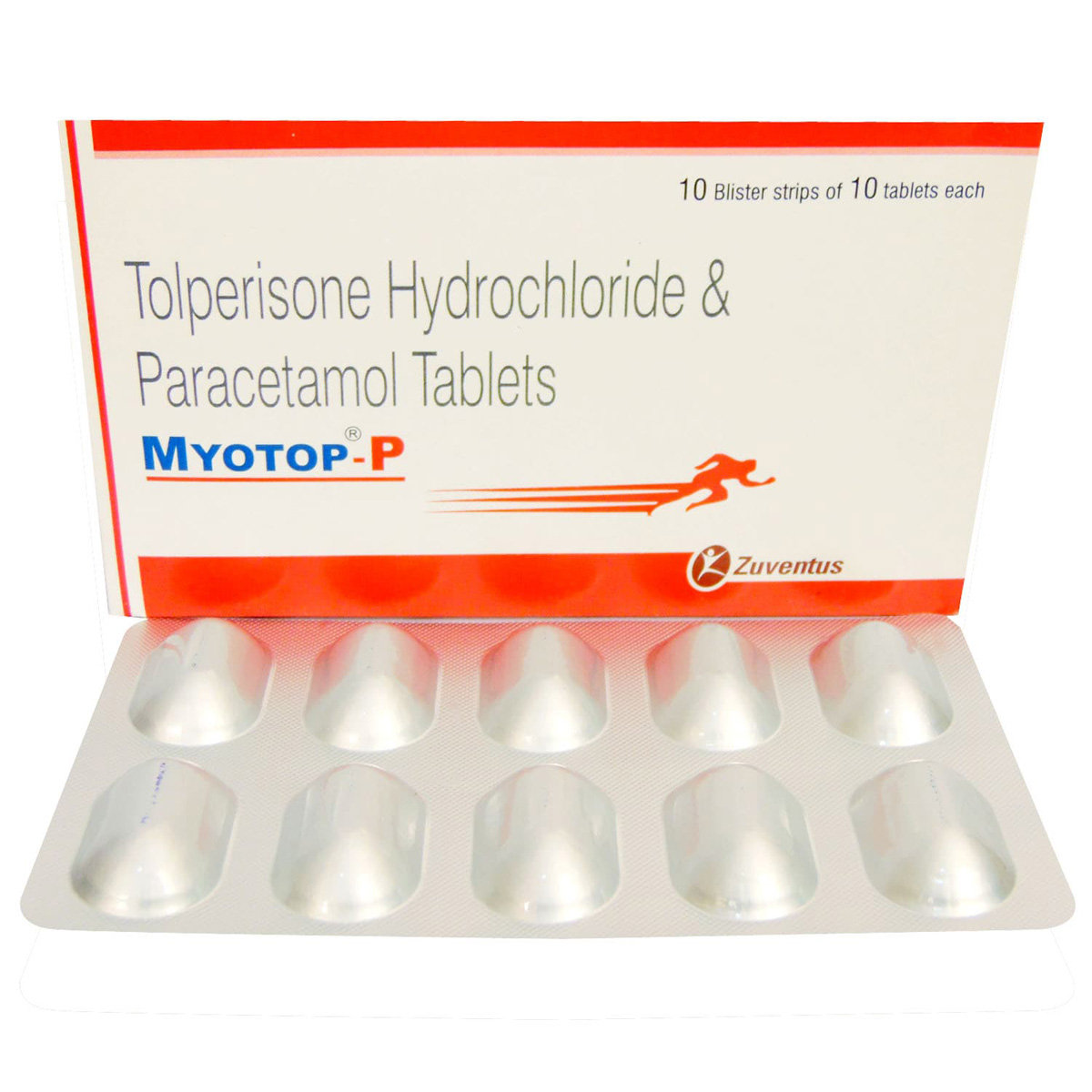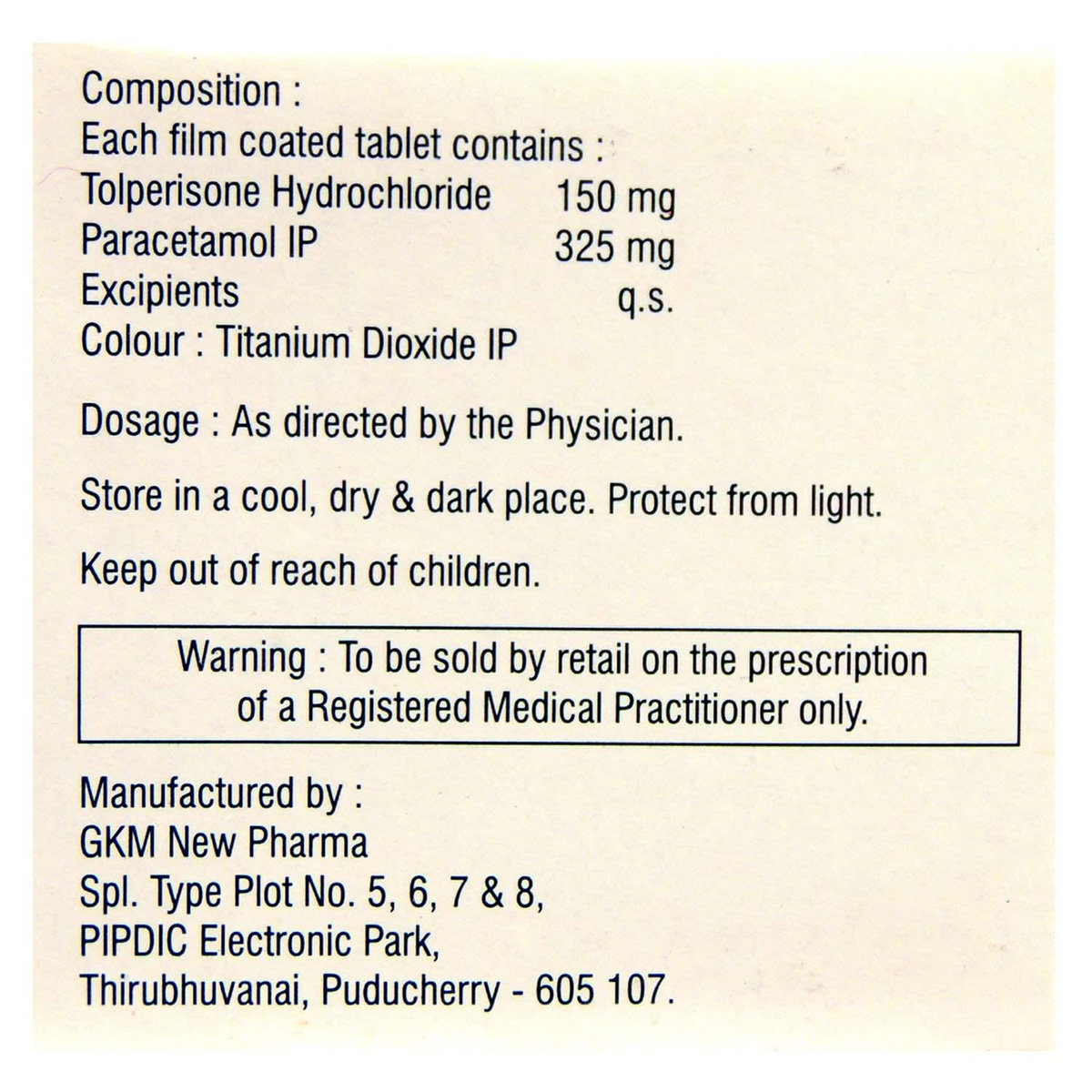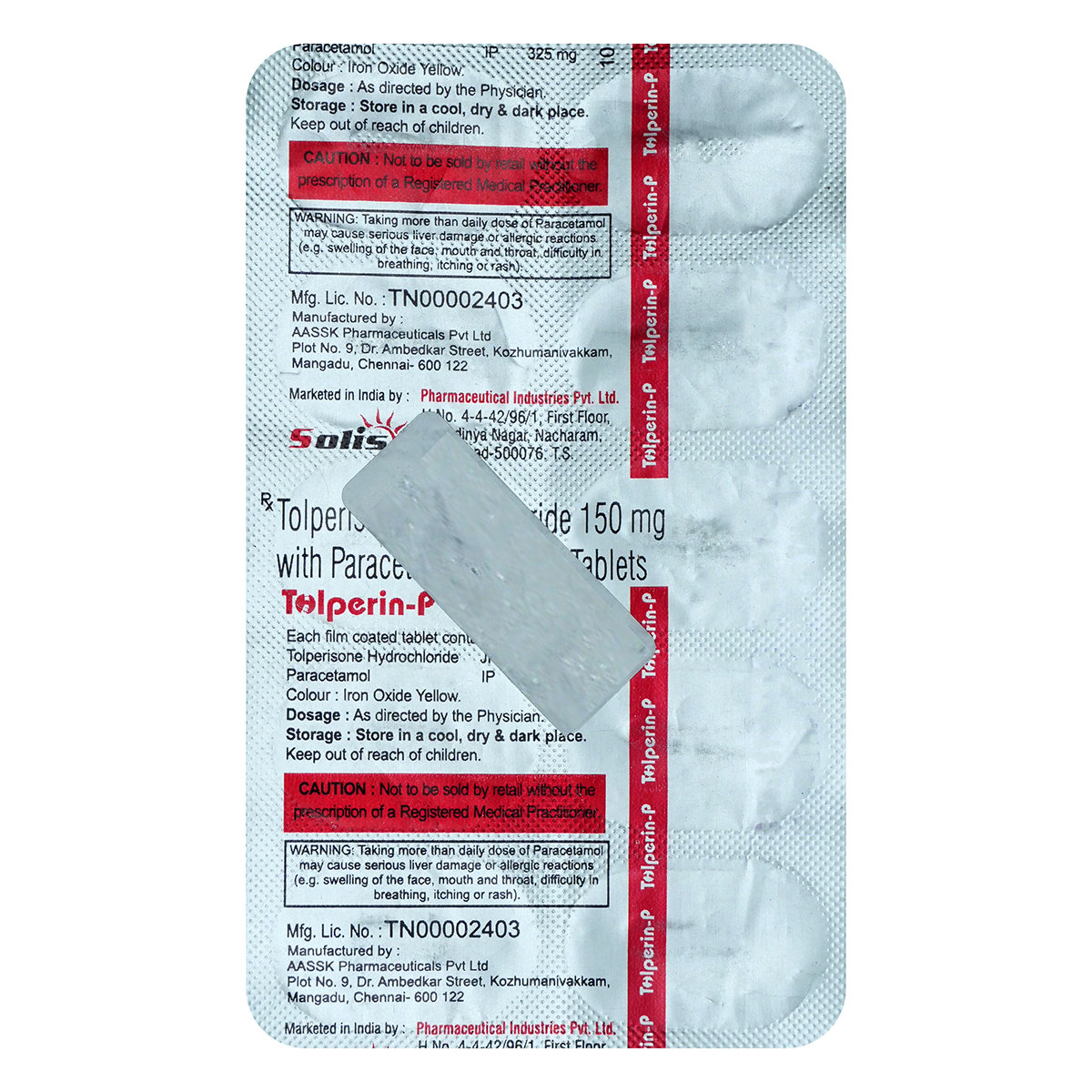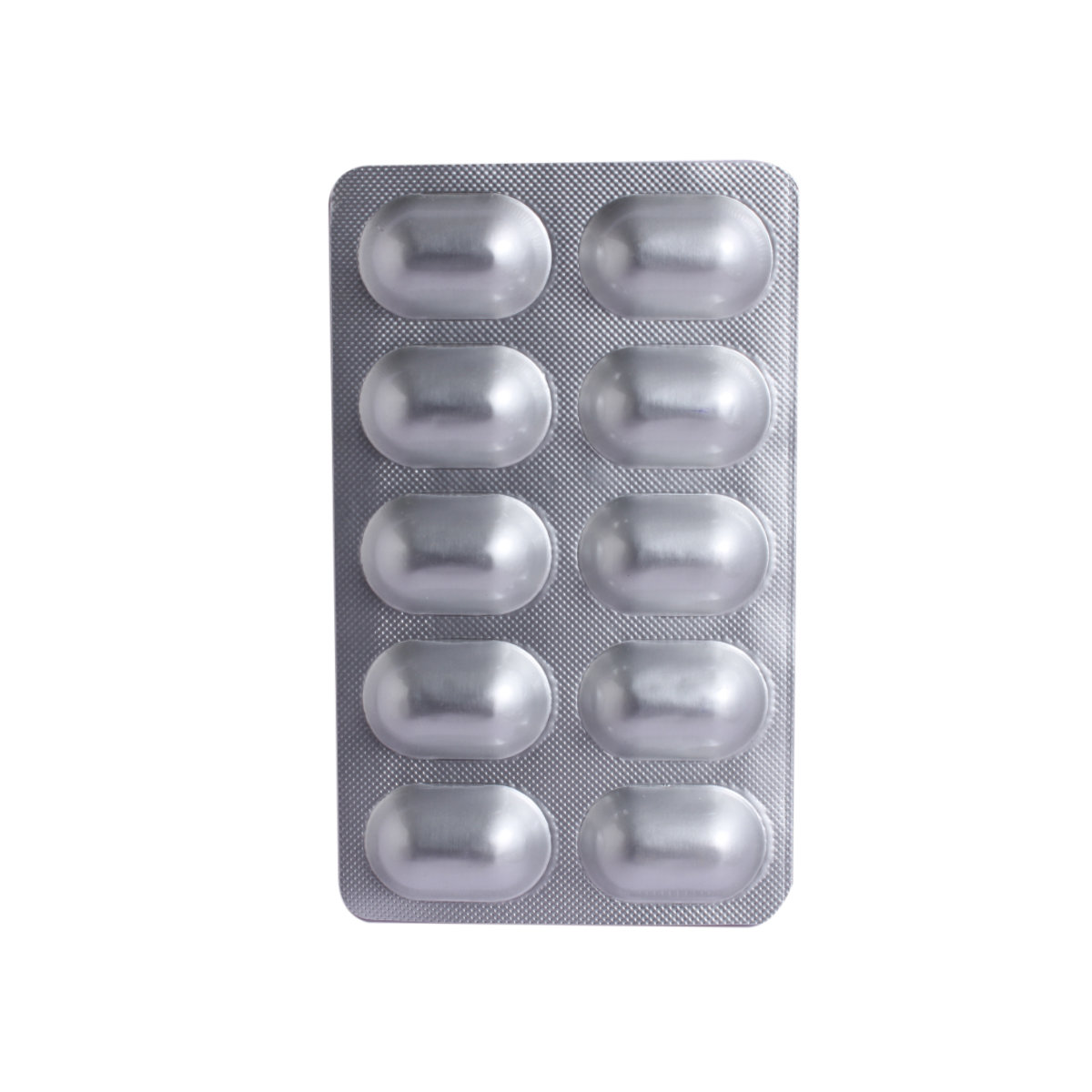Myotop P Tablet 10's
MRP ₹184.5
(Inclusive of all Taxes)
₹27.7 Cashback (15%)
Provide Delivery Location
Online payment accepted
 Prescription drug
Prescription drugWhats That
Composition :
Manufacturer/Marketer :
Consume Type :
Expires on or after :
Return Policy :
About Myotop P Tablet
Myotop P Tablet belongs to the class of medicine called 'muscle relaxant' in combination with a painkiller, used to treat muscle spasms. It improves the movement of muscles and provides relief from pain and discomfort caused by the muscle spasm. A muscle spasm occurs due to involuntary contractions of a muscle. A spasm may be a twitch in the muscle or may feel tight or hard, like a knot.
Myotop P Tablet is a combination of two drugs: Tolperisone (muscle relaxant) and Paracetamol (pain killer). Tolperisone is a centrally acting muscle relaxant. It works on the spinal cord and brain to relieve contraction or muscle stiffness. It also increases the supply of blood to the muscles. Paracetamol is an analgesic (pain reliever) and an antipyretic (fever reducer). It inhibits cyclo-oxygenase (COX) enzymes that further prevent the formation of chemical messengers called 'prostaglandins' (PGs). These prostaglandins are produced at injury sites and cause pain and swelling. By blocking the COX enzyme's effect, lesser PGs are produced, which reduces mild to moderate pain and inflammation at the injured or damaged site.
Your doctor will decide the dose and duration based on the severity of your pain. Common side effects of Myotop P Tablet include nausea, vomiting, dry mouth, dizziness, weakness and sleepiness. These side effects are not familiar to everyone and vary individually.
Let your doctor know if you use any prescription and non-prescription medications before starting Myotop P Tablet . Inform your doctor if you have any liver, heart or kidney diseases, myasthenia gravis (fatigue of muscles) and phenylketonuria (a genetic disorder that causes an amino acid build-up, phenylalanine) and alcohol dependency. Consult your doctor before taking Myotop P Tablet if you are pregnant or planning for pregnancy. Myotop P Tablet may cause dizziness, so drive only if you are alert and focused. Myotop P Tablet should not be given to children as safety has not been established. Avoid consuming alcohol and Myotop P Tablet as it could lead to increased dizziness and risk of liver damage.
Uses of Myotop P Tablet
Directions for Use
Key Benefits
Myotop P Tablet treats muscle spasms and consists of Tolperisone (muscle relaxant) and Paracetamol (pain killer). Tolperisone is a centrally acting muscle relaxant. It works on the spinal cord and brain to relieve contraction or muscle stiffness. It also increases the supply of blood to the muscles. Paracetamol is an analgesic (pain reliever) and an antipyretic (fever reducer). It inhibits cyclo-oxygenase (COX) enzymes that further prevents the formation of chemical messengers called 'prostaglandins' (PGs). These prostaglandins are produced at injury sites and cause pain and swelling. By blocking COX enzyme's effect, lesser PGs are produced, which reduces mild to moderate pain and inflammation at the injured or damaged site.
Storage
Drug Warnings
Inform your doctor if you have any liver, heart or kidney diseases, myasthenia gravis (fatigue of muscles), phenylketonuria (a genetic disorder that causes a build-up of an amino acid, phenylalanine), and alcohol dependency before starting Myotop P Tablet . Consult your doctor before taking Myotop P Tablet if you are pregnant, planning for pregnancy or breastfeeding. Myotop P Tablet may cause dizziness, so drive only if you are alert and focused. Avoid consuming alcohol along with Myotop P Tablet as it could lead to increased dizziness and risk of liver damage. Myotop P Tablet is not recommended in children as safety and efficacy is not established.
Diet & Lifestyle Advise
- Exercising regularly helps in muscle stretching that is less likely to spasm, tear and sprain. Mild exercises such as jogging and walking are helpful for muscle stretching.
- Massages can also be helpful.
- Avoid freezing and hot temperatures.
- Avoid wearing tight-fitting clothes, instead, wear loose garments.
- Rest well and get plenty of sleep.
- To avoid developing pressure sores, change your position at least every two hours.
- Hot or cold therapy can haelp treat muscle spasms. Apply an ice-pack or hot-pack on the muscle for 15-20minutes.
- Stay hydrated, drink plenty of water.
Side Effects of Myotop P Tablet
- Nausea
- Vomiting
- Dry mouth
- Dizziness
- Weakness
- Sleepiness
Habit Forming
Therapeutic Class
All Substitutes & Brand Comparisons
RX
Out of StockPalimur 150mg/325mg Tablet
₹95
(₹8.55 per unit)
48% CHEAPERRX
Out of StockNixotop-P 150/325 Tablet 10's
Innovative Life Sciences Pvt Ltd
₹97.79
(₹8.8 per unit)
47% CHEAPERRX
Out of StockMyo Well Plus 150mg/325mg Tablet
₹110
(₹9.9 per unit)
40% CHEAPER
Author Details
We provide you with authentic, trustworthy and relevant information
FAQs
Drug-Drug Interactions Checker List
- WARFARIN
- METOCLOPRAMIDE
- DOMPERIDONE
- CHOLESTYRAMINE
- IMATINIB
Special Advise
- Let your doctor know that you are taking Myotop P Tablet if you are undergoing any medical tests.
- Myotop P Tablet may cause fluid retention (oedema), hence it is advised to monitor blood pressure and cardiovascular status in patients with a heart failure history.
- Explain a detail history to the doctor as use of Myotop P Tablet is contraindicated in patients with myasthenia gravis.
Disease/Condition Glossary
Pain is a symptom triggered by the nervous system, causing uncomfortable sensations in the body.
Muscle spasm is the sudden involuntary contractions of the muscle, which can be painful and uncomfortable. When the nerve impulses that control the muscle movements are damaged or interrupted, it could lead to muscle spasms. A spasm may be a twitch in the muscle or may feel tight or hard, like a knot.

Have a query?
Alcohol
Safe if prescribed
You are recommended to avoid alcohol consumption while taking Myotop P Tablet . Alcohol intake, along with Myotop P Tablet , may cause increased dizziness and risk of liver damage.
Pregnancy
Consult your doctor
Myotop P Tablet should be used with caution during pregnancy. Please consult your doctor before taking Myotop P Tablet .
Breast Feeding
Consult your doctor
Myotop P Tablet should be used with caution during breastfeeding. Please consult your doctor before taking Myotop P Tablet .
Driving
Safe if prescribed
Myotop P Tablet may make you feel dizzy. Do not drive or operate machinery if you experience dizziness.
Liver
Consult your doctor
Please consult your doctor since Myotop P Tablet should be used with caution in patients with liver impairment/liver disease.
Kidney
Consult your doctor
Please consult your doctor since Myotop P Tablet should be used with caution in patients with kidney impairment/kidney disease.
Children
Safe if prescribed
Myotop P Tablet is not recommended in children as safety and efficacy is not established.













